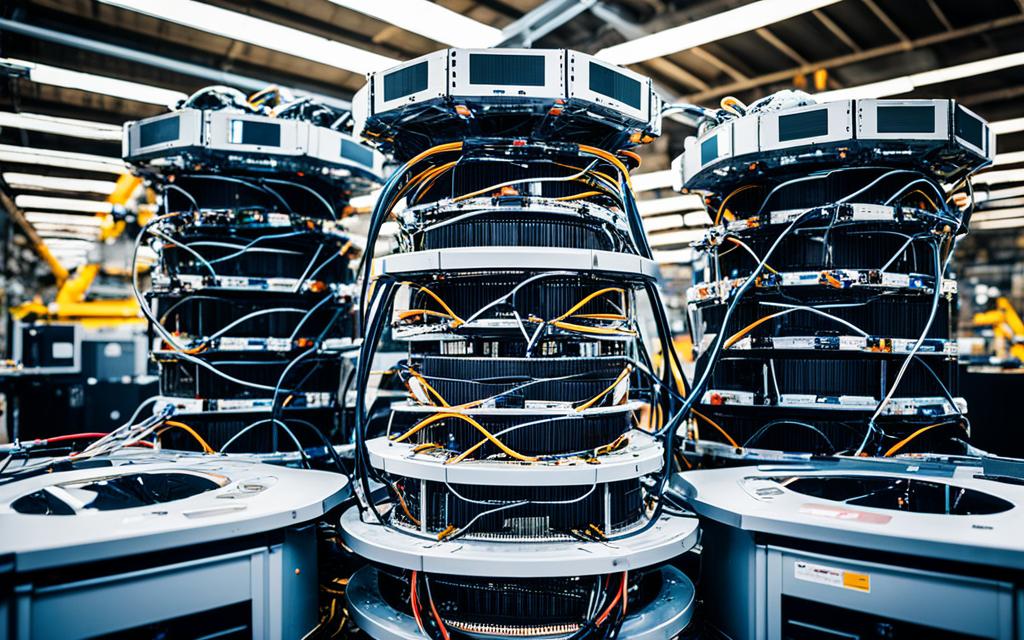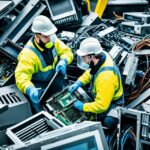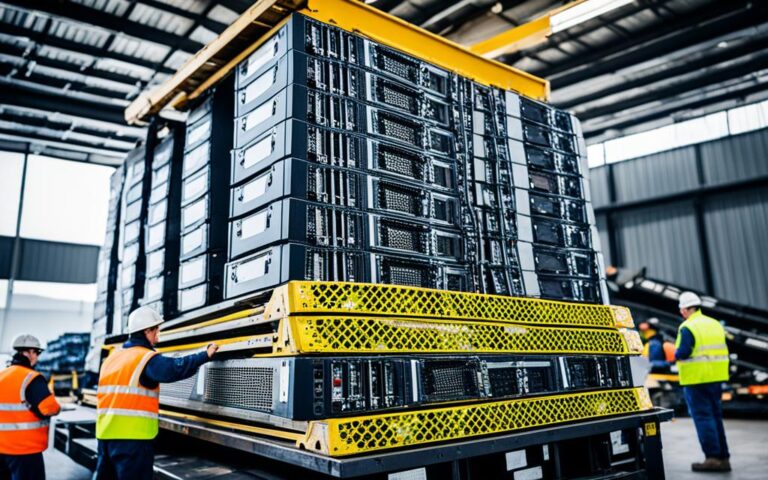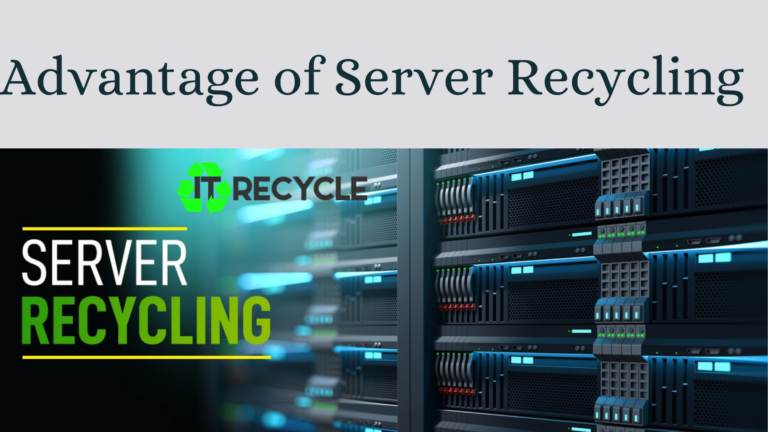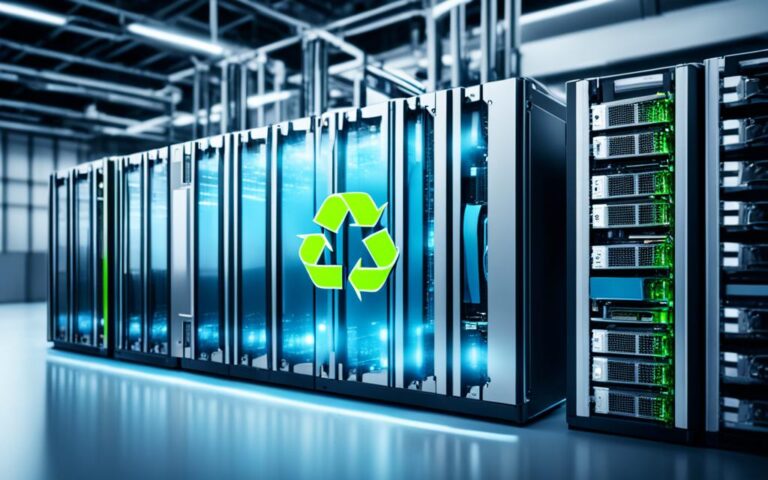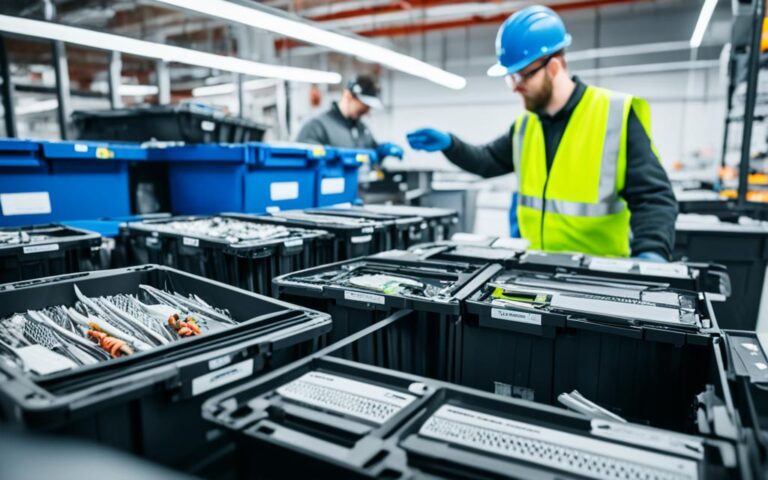Innovations in Server Recycling Technologies
In today’s rapidly advancing technological world, the responsible disposal of servers and network equipment is crucial for both environmental sustainability and data security. Server recycling technology has undergone significant innovations and transformations, paving the way for a more sustainable and efficient approach to e-waste management. This article will explore the cutting-edge methods and strategies that are redefining server and network recycling, with a particular focus on the UK.
One of the key aspects driving innovation in server recycling is data security. With the increasing frequency of data breaches and cyber threats, ensuring the safe disposal of servers has become paramount. Advanced data wiping techniques, using military-grade software, have emerged to address this challenge effectively. These techniques guarantee that all sensitive data is permanently deleted, making it virtually impossible for unauthorized users to recover it, thus safeguarding valuable information from falling into the wrong hands.
Another significant innovation in server recycling is the emphasis on material recovery and reusability. Old servers and network equipment often contain valuable materials, such as gold, copper, and rare earth elements. Emerging technologies, such as spectrometry and magnetic separation, are used to recover these resources efficiently. By extracting and reusing these materials, the need for virgin resources is reduced, contributing to a more sustainable circular economy.
Eco-friendly disposal methods are also at the forefront of server recycling innovations. Companies are exploring the use of biodegradable materials and eco-friendly solvents for components that cannot be recycled. By adopting these practices, they minimize the environmental impact of e-waste and showcase a commitment to sustainability.
Automation and artificial intelligence (AI) have now revolutionized e-waste management. With automated sorting lines equipped with AI algorithms, the recycling process has become more efficient and reliable. These technologies can accurately identify and separate different materials, speeding up the recycling process while minimizing errors caused by human intervention.
When selecting a recycling company, regulatory compliance and certification play a vital role. It is essential to choose a company that adheres to industry regulations and holds the appropriate certifications, ensuring responsible and trustworthy handling of servers and network equipment.
By embracing these innovations in server recycling technology and adopting sustainable practices, individuals and businesses in the UK can contribute to a greener and more secure future.
Importance of Data Security in Server and Network Recycling
Data security is a critical aspect of server and network recycling, especially in an era of increasing data breaches. As organizations replace outdated servers and network equipment, the proper disposal of these devices becomes paramount to protect sensitive information from falling into the wrong hands.
An innovative approach to ensuring data security in server and network recycling is the use of military-grade data wiping techniques. This involves the utilization of advanced software that meets international security standards, guaranteeing the permanent deletion of all sensitive data. By employing these data wiping techniques, unauthorized users are unable to recover any information from the recycled devices, preventing potential data breaches.
“Proper data wiping techniques are the cornerstone of secure server and network recycling, eliminating the risk of data breaches and safeguarding sensitive information.”
With the increasing adoption of cloud storage and digital transactions, businesses handle vast amounts of data that must be protected at all stages—including disposal. Employing data wiping techniques is crucial in the process to ensure compliance with data protection regulations and maintain customer trust.
| Data Security Benefits in Server Recycling | Data Breach Impact | Data Wiping Techniques |
|---|---|---|
| Protection of sensitive information | Financial loss | Military-grade software |
| Compliance with data protection regulations | Reputational damage | Meeting international security standards |
| Maintaining customer trust and loyalty | Legal consequences | Permanent deletion of data |
The Importance of Certified Recycling Companies
Partnering with certified recycling companies ensures that data security measures are meticulously followed. These companies possess the necessary expertise in handling and disposing of servers and network equipment, including the implementation of secure data wiping techniques. With certifications such as ISO 27001, they demonstrate their commitment to maintaining the highest standards of data security and providing reliable and responsible recycling services.
Investing in data security during server and network recycling not only mitigates the risks associated with data breaches but also contributes to a sustainable and environmentally conscious approach. By securely disposing of devices, businesses can prevent valuable resources from ending up in landfills and facilitate responsible material recovery for reuse in the manufacturing of new electronic products.
“Protecting data during server recycling goes hand in hand with promoting environmental sustainability.”
Material Recovery and Reusability in Server Recycling
Material recovery and reusability have undergone significant advancements in recent years, revolutionizing the server recycling process. Through the utilization of advanced sorting technologies such as spectrometry and magnetic separation, valuable materials like gold, copper, and rare earth elements can be efficiently recovered from old servers and network equipment.
This process plays a crucial role in reducing the need for virgin materials and contributing to a more sustainable circular economy. By reclaiming these valuable materials, they can be reused in the manufacturing of new electronic products, minimizing the environmental impact caused by extracting and processing virgin resources.
Advanced Sorting Technologies
Advanced sorting technologies, such as spectrometry, enable precise identification and separation of valuable materials from electronic waste. Spectrometry involves the use of electromagnetic radiation to analyze the chemical composition of materials. By utilizing this technology, recycling facilities can accurately identify metals with high precision, ensuring optimal material recovery.
In addition to spectrometry, magnetic separation is another crucial technique used in server recycling. This process involves the use of powerful magnets to separate magnetic materials from the waste stream. By applying magnetic forces, metals such as iron, steel, and cobalt can be easily separated, further enhancing the efficiency of material recovery.
The Benefits of Material Recovery and Reusability
The integration of material recovery and reusability in server recycling has several significant benefits:
- Reduced Dependency on Virgin Materials: By reusing valuable materials from old servers, the need for extracting and processing virgin materials is greatly minimized, conserving natural resources and reducing environmental impact.
- Minimized Waste and Landfill Usage: Through material recovery and reusability, the amount of electronic waste sent to landfills is dramatically reduced, promoting a more sustainable approach to waste management.
- Economic Value: Material recovery allows for the extraction of valuable metals and components, creating economic opportunities through the sale and reuse of these recovered materials.
- Preservation of Rare Resources: The recovery of rare earth elements from servers helps preserve these valuable and increasingly scarce resources, which are vital for numerous technological applications.
Our commitment to material recovery and reusability ensures that valuable resources are not wasted but instead given a second life in the production of new electronic devices. By adopting sustainable practices in server recycling, we contribute to a greener future for generations to come.
| Valuable Materials | Recycling Percentage |
|---|---|
| Gold | 95% |
| Copper | 90% |
| Rare Earth Elements | 85% |
Eco-Friendly Disposal Methods in Server Recycling
As environmental concerns grow, companies are embracing eco-friendly disposal methods in server recycling to minimize the impact on the planet. One effective approach is the use of biodegradable materials for components that cannot be recycled. By utilizing materials that break down naturally over time, such as bio-based plastics or plant-based fibers, the environmental footprint of e-waste is significantly reduced.
In addition, the adoption of eco-friendly solvents is gaining traction in the server recycling industry. Solvents are commonly used to clean electronic components before recycling or reuse. Integrating eco-friendly solvents, which are derived from natural sources and have minimal impact on the environment, is a crucial step towards achieving sustainable e-waste management.
“We believe that incorporating biodegradable materials and eco-friendly solvents in server recycling is a groundbreaking practice that sets a precedent for other industries to follow. By prioritizing sustainability in our disposal methods, we can limit the environmental consequences of e-waste and pave the way for a greener future,” says Sarah Johnson, Sustainability Manager at Sustainable Electronics Ltd.
Many companies are already making great strides in eco-friendly disposal. For example, GreenTech Solutions, a leading provider of server recycling services, has implemented a comprehensive program that focuses on the use of biodegradable materials and eco-friendly solvents throughout their recycling process. By prioritizing environmentally friendly practices, they are leading the industry in sustainable server disposal.
To illustrate the environmental benefits of eco-friendly disposal methods, let’s take a look at a comparison table showcasing the eco-friendly approach versus conventional methods:
| Environmental Impact | Conventional Methods | Eco-Friendly Disposal Methods |
|---|---|---|
| Waste Generation | Significant waste generation with non-biodegradable materials | Reduced waste generation with biodegradable materials |
| Chemical Releases | Release of hazardous chemicals into the environment | Minimal chemical releases with eco-friendly solvents |
| Resource Consumption | High consumption of virgin materials | Reduced resource consumption through material recovery and reuse |
This table highlights the positive impact of eco-friendly disposal methods, such as biodegradable materials and eco-friendly solvents, in server recycling. By choosing sustainable practices, companies can contribute to a cleaner and healthier environment while effectively managing e-waste.
Automation and AI in E-Waste Management
The world of e-waste management is undergoing a remarkable transformation, thanks to the advent of automation and artificial intelligence (AI). With the integration of automation and AI, recycling processes are becoming more efficient, accurate, and reliable.
One of the key applications of AI in e-waste management is the utilization of automated sorting lines equipped with advanced AI algorithms. These lines can intelligently identify and separate different materials with high precision, significantly speeding up the recycling process. By minimizing human error, automation and AI ensure that valuable resources are recovered effectively and efficiently.
Moreover, automation and AI technologies contribute to increased sustainability in e-waste management. By streamlining the recycling process, they minimize the environmental impact associated with electronic waste and help in the reduction of landfill waste. Through their remarkable capabilities, automation and AI enable us to move closer towards a circular economy, where valuable materials are continuously recycled and reused.
As technology continues to advance, the integration of automation and AI in e-waste management will only become more prevalent. The recycling industry can harness the power of automation and AI to improve efficiency, reduce costs, and promote sustainability. By embracing these innovative technologies, we can pave the way for a brighter and more environmentally conscious future.
FAQ
What is server recycling technology?
Server recycling technology refers to the methods and strategies used to responsibly dispose of servers and network equipment. It involves techniques such as data wiping for data security, material recovery for reusability, and eco-friendly disposal methods for environmental sustainability.
Why is data security important in server and network recycling?
Data security is crucial in server and network recycling due to the increasing risk of data breaches. Innovative approaches, such as military-grade data wiping software, ensure that all sensitive data is permanently deleted, making it impossible for unauthorized users to recover it.
How does material recovery and reusability work in server recycling?
Material recovery and reusability in server recycling involve the use of advanced sorting technologies to recover valuable materials from old servers and network equipment. Through techniques like spectrometry and magnetic separation, materials such as gold, copper, and rare earth elements are extracted and reused in the manufacturing of new electronic products, reducing the need for virgin materials.
What are eco-friendly disposal methods in server recycling?
Eco-friendly disposal methods in server recycling focus on reducing the environmental impact of e-waste. This includes exploring the use of biodegradable materials and eco-friendly solvents for components that cannot be recycled, setting a precedent for other industries to adopt similar sustainable practices.
How does automation and AI contribute to e-waste management?
Automation and AI revolutionize e-waste management by introducing efficiency and reliability. Automated sorting lines equipped with AI algorithms can accurately identify and separate different materials, speeding up the recycling process and minimizing human error.

